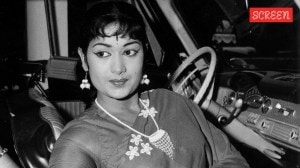Priya ‘Rajni’ Tendulkar dies at 48
‘‘I never switch off my cell phone. Anyone can reach me anytime,’’ said Priya Tendulkar the last time The Indian Express...

‘‘I never switch off my cell phone. Anyone can reach me anytime,’’ said Priya Tendulkar the last time The Indian Express asked her for a quote on the growing callousness in the city. The mobile was finally switched off on Thursday, as the firebrand actress-activist passed away at the age of 48 after a long battle with cancer.
Daughter of renowned playwright Vijay Tendulkar, Priya became a household name with Basu Chatterjee’s Rajni in 1985. The tele-serial, in which the protagonist fought a different part of a corrupt civic system every episode, will be remembered as the first of its kind.
‘‘She was rather reluctant to take up the role of Rajni. Neither of us expected the serial to be such a huge hit,’’ recalls Basu Chatterjee, who had also thought of Bindiya Goswami and Padmini Kolhapure for the character. When Kolhapure declined because of lack of dates, Priya’s name was suggested by Karan Razdan, the serial’s co-writer who later became her husband.
She returned to the small screen latterly with The Priya Tendulkar Show and the grilling session Zimmedar Kaun. That she’d lost none of her trademark spiritedness was clear from one episode of the second serial, getting into a fierce argument with Mumbai’s deputy municipal commissioner Chandrashekhar Rokde.
One of her interviewees, Nana Chudasama, remembers Priya as a courageous woman. ‘‘Very forthright, she knew how to get people to speak the truth,’’ he says. Her activism was not confined to the screen; she had strong socialist leanings and, despite her illness, tried to participate in all possible morchas of the Narmada Bachao Andolan.
Tendulkar began her acting career on the stage before taking to the screen with Shyam Benegal’s Ankur, in 1973. While her Marathi theatre contributions include plays like Gidhade, Tee Phulrani and Ek Hatti Mulgi, she also acted in Marathi films like Gondhalatgondhal, Dhakti Jau and Tuch Majhi Rani.
‘‘She was the strongest human being I have known,’’ says her now-estranged husband Razdan, adding, ‘‘she used it for a good cause. Though certain insecurities affected our relationship, both of us had reached an understanding to not to talk about it in public.’’
Razdan gives Priya the credit for encouraging the writer in him. ‘‘When I wrote Choti Badi Batein, she told me how I walk a tightrope between realism and commercialism,’’ says Razdan, remembering when she stood by him in the loss he experienced with his father’s death. ‘‘I had lost my voice, and she read out my script of Time Machine to Shekhar Kapur and Suresh Malhotra.’’
Jaidev Hattangady remembers her as part of a mutual admiration club. ‘‘Both of us admired each other,’’ says the director, who first noticed her in 1969 in Girish Karnad’s Haya Vadhana, as a doll. ‘‘I saw her grow as an actress. Her versatility also reflected in her poetry and a collection of short stories in Marathi.’’
One of her literary efforts, Prashna Jhyasa Tyasa, won the Maharashtra state award. Academician-activist Pushpa Bhave remembers how positively Priya took her criticism of her lead role in Shirish Pai’s Ek Kali Phulli Hoti.
She remembers meeting the actress time and again, only to be asked whether her effort toward voice modulation was working or not. ‘‘A very private person, she kept her illness and her long-drawn battle with it a secret,’’ says Bhave.
For Vijay Tendulkar, the death of his daughter completes a double tragedy; his son died in a road accident last year.





- 01
- 02
- 03
- 04
- 05

























